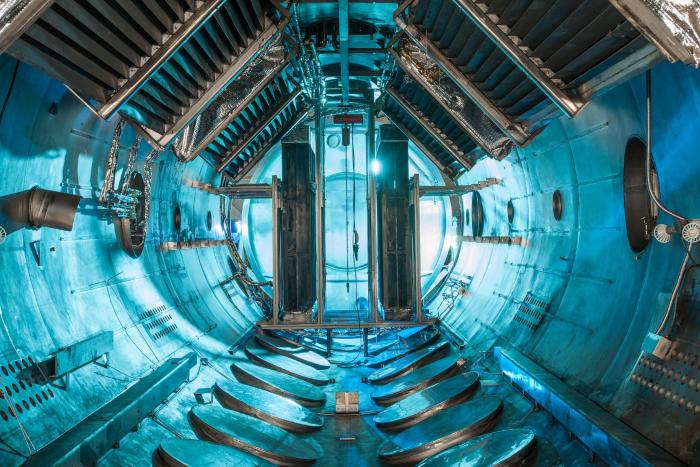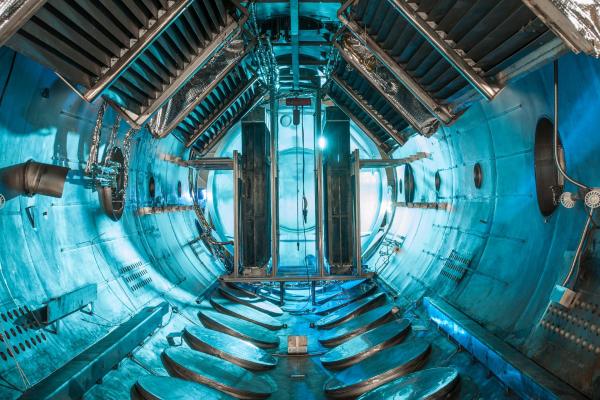
Mechanical Engineering MEng
Master
In Bradford

Description
-
Type
Master
-
Location
Bradford
-
Duration
4 Years
-
Start date
Different dates available
Mechanical Engineering is the broadest of all the engineering disciplines. A degree in this subject will place you at the heart of industries including:
power generation
food processing
automotive and rail
aerospace
You’ll combine physics, materials science and computational methods to create complex systems which are economic, reliable, efficient and sustainable.
On graduation you will be industry ready, with a working knowledge of:
the core analytical and scientific principles which underpin mechanical engineering
computer-aided design and manufacturing (CADCAM)
computer-aided engineering (CAE) techniques
There is a high demand for mechanical engineers, and you’ll have a wide range of career opportunities as a graduate.
This MEng programme includes a fourth year of study, and fulfils the formal educational requirements required to present yourself for CEng registration. It is also available with a placement year.
Facilities
Location
Start date
Start date
About this course
Typical offer: BBC / 112 UCAS points
Reviews
This centre's achievements
All courses are up to date
The average rating is higher than 3.7
More than 50 reviews in the last 12 months
This centre has featured on Emagister for 15 years
Subjects
- Mechanical Engineering
- Design
- Mathematics
- Mechanics
- Supply
- Thermodynamics
- Materials
- Computer Aided Design
- Appreciation
- International
- Project
- Systems
- Technology
- Industry
- Engineering
- Computational
- GCSE Mathematics
- Fluid Mechanics
Course programme
The modules for this course can be found in the latest programme specification.
The programme is intended to equip students with the ability to use general and specialist knowledge and understanding of engineering to optimise the application of existing technology and to produce innovative uses for emerging technology.
Year 1
- Engineering Mathematics (20 credits) - core
To develop mathematical knowledge, understanding and skills in fundamental topics of mathematics so that students can later build on these to describe, model, analyse and evaluate engineering problems using a range of mathematical techniques and appropriate software for calculations. - Computer Aided Engineering (20 credits) - core
To provide an appreciation of computer aided design, analysis and simulation methods over a range of engineering disciplines (Chemical, Civil, Mechanical and Medical) and to provide experience of the use of industry standard CAE tools through design, modelling, simulation, analysis of structures, processes, systems or components. - Materials Technology & Structural Mechanics (20 credits) - core
Provides an introduction to engineering materials and their properties, with particular reference to their manufacturing technology, selection and different industrial applications. - Skills for Engineering (20 credits) - core
The module is designed to provide a project based hands on team based module with integrates the learning from other modules during the first year. - Machines Mechanics and Mechatronics (20 credits) – core
To develop an understanding of basic electrical and electronic circuits, mechanical power transmission and components and the laws which govern their behaviours. - Fluid Mechanics 1 (10 credits) - core
To understand the basic concepts that describes the mechanical behaviour of fluids. - Thermodynamics 1 (10 credits) - core
In this module you will the fundamental concepts of energy and how it relates to work, power and efficiency will be explained.
At the end of Year 1, students will be eligible to exit with the award of Certificate of Higher Education if they have successfully completed at least 120 credits and achieved the award learning outcomes.
Year 2
- Further Engineering Mathematics and Statistics (20 credits) - core
To establish an appreciation and working knowledge of the premise that analytical (deterministic) and statistical tools are components of a larger integrated tool kit for addressing and evaluating multiple solutions to a variety of engineering-based problems. - Material Engineering and Design (20 credits) – core
The aim of this module is to develop core technical knowledge and understanding of the intimate relationship between mechanical engineering design (form and function), manufacturing methods and materials selection. - Engineering Statics & Dynamics (20 credits) – core
To evaluate the concepts of a general three-dimensional stress and strain state and to relate these concepts to the behaviour of actual materials and structural elements. - Control Engineering (20 credits) – core
This module provides a solid theoretical foundation for understanding feedback control system analysis and design in both the time and frequency domains. - Financial and Project Management (20 credits) - core
Enable students to acquire a sound understanding of the financial and accounting principles, and apply these principles for decision making and control purposes in a commercial business environment. - Fluid Mechanics 2 (10 credits) – core
To examine the principles of fluid flow, with an emphasis on the analysis of flows that are common in engineering fields. - Thermodynamics 2 (10 credits) – core
To review Thermodynamics as the science of energy conversion; to apply the subject to the analysis of simple processes; to introduce heat transfer.
At the end of Year 2, students will be eligible to exit with the award of Diploma of Higher Education if they have successfully completed at least 240 credits and achieved the award learning outcomes.
Year 3
- Project (30 credits) - core
- Six Sigma for Business Excellence (10 credits) - core
The students will be able to acquire a deep understanding of the theories and practices of six sigma and associated quality assurance and management principles, and directly apply them to a variety of product and service industries. - Advanced Engineering Design (20 credits) – core
The aim of this module is to develop both technical deepening and critical understanding of mechanical engineering design within a holistic sustainable product development context. - Materials Failure Analysis (20 credits) – core
This module aims to provide the integrated knowledge and skills to recognise the important failure mechanisms which lead to catastrophic structural failure under static & cyclic loading. - Advanced Fluid Mechanics with Aerodynamics (20 credits) – optional
Examines the principles of fluid flow relevant to a wide range of industries. To qualify and quantify the effects of these internal and external flows upon the flight of airplanes, the performance of ground vehicles and industrially engineering machinery. - Reliability & Safety Engineering (20 credits) – optional
The students will be able to develop a detailed knowledge of the theories, principles and practices of reliability and safety engineering and apply these principles in the design, operation and maintenance of complex systems. - Sensors & Instrumentation (20 credits) – optional
To provide knowledge of a wide range of sensors and actuators for general use and the analytical skills and knowledge to specify and design simple sensor and actuator applications. - Manufacturing Systems Engineering (20 credits) – optional
To study the concepts of PUSH/ PULL (JIT/lean) methods of planning & control of manufacturing systems.
Students will be eligible for the award of Honours Degree of Bachelor if they have successfully completed at least 360 credits and achieved the award learning outcomes.
Final year
- Interdisciplinary Competitive Design (20 credits) – core
To provide the advanced knowledge base necessary to bring a product or project to a successful near market state through a series of structured design and innovation processes in an interdisciplinary group approach to define a product or project to meet market requirements. - Engineering Vibration (20 credits) – core
To study the fundamentals of vibration and vibration control of single and multi-degrees of freedom mechanical systems both analytically and via the use of computer methods. - Design Optimisation (10 credits) – core
To establish an appreciation for the role of optimisation in modern engineering practice and to provide evidence for the premise that optimisation is one component of an integrated tool kit for addressing and evaluating multiple solutions to a variety of engineering-based problems. - Materials & Manufacturing Processes (20 credits) – optional
To provide specialist knowledge of manufacturing methods used in the design and development of operations to process engineer materials with advanced properties, consistent attributes and with sound structural integrity. - Aerospace Manufacturing and Management (10 credits) – optional
Provide an integrated and in-depth knowledge of the production operations, management and commercial principles associated with the manufacture of complex, high value added products, through a detailed analysis of the aerospace industry. - Environmental Computational Fluid Dynamics (10 credits) – optional
To understand fundamental principles of the advanced numerical simulations in hydrodynamics. - Advanced Solid Mechanics (20 credits) – core
To extend knowledge of Solid Mechanics in the context of modern mathematical analysis. To develop understanding of stresses and strains while emphasising their parallels. - Supply Chain Management (20 credits) – optional
To develop a comprehensive and in-depth knowledge on supply chain network management. The focus of the module will be on the management of supply chain networks and the integration of supply chain with information communication technology. - Polymer Engineering (20 credits) – optional
To provide for the development and implementation of specialist knowledge/methods in the relationships between materials structure, properties and processing. - Risk Management (10 credits) – optional
Acquire a deep understanding of the concepts and principles of risk management and its interaction with other management activities, and directly apply them in a range of product and service industries. - Engineering Computational Methods (10 credits) – optional
To critically review the application of the Finite Element (FE) method as a tool for engineering analysis.
Mechanical Engineering MEng

